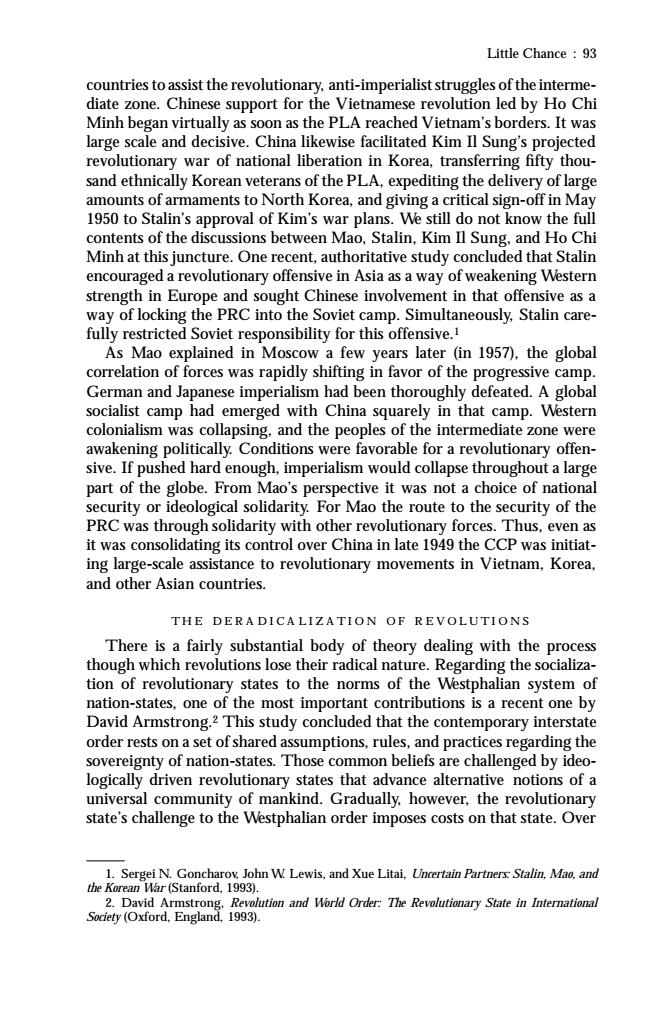正在加载图片...

Little Chance 93 countries to assist the revolutionary,anti-imperialist struggles of the interme- diate zone.Chinese support for the Vietnamese revolution led by Ho Chi Minh began virtually as soon as the PLA reached Vietnam's borders.It was large scale and decisive.China likewise facilitated Kim Il Sung's projected revolutionary war of national liberation in Korea,transferring fifty thou- sand ethnically Korean veterans of the PLA,expediting the delivery of large amounts of armaments to North Korea,and giving a critical sign-off in May 1950 to Stalin's approval of Kim's war plans.We still do not know the full contents of the discussions between Mao,Stalin,Kim Il Sung,and Ho Chi Minh at this juncture.One recent,authoritative study concluded that Stalin encouraged a revolutionary offensive in Asia as a way of weakening Western strength in Europe and sought Chinese involvement in that offensive as a way of locking the PRC into the Soviet camp.Simultaneously,Stalin care- fully restricted Soviet responsibility for this offensive. As Mao explained in Moscow a few years later (in 1957),the global correlation of forces was rapidly shifting in favor of the progressive camp. German and Japanese imperialism had been thoroughly defeated.A global socialist camp had emerged with China squarely in that camp.Western colonialism was collapsing.and the peoples of the intermediate zone were awakening politically.Conditions were favorable for a revolutionary offen- sive.If pushed hard enough,imperialism would collapse throughout a large part of the globe.From Mao's perspective it was not a choice of national security or ideological solidarity.For Mao the route to the security of the PRC was through solidarity with other revolutionary forces.Thus,even as it was consolidating its control over China in late 1949 the CCP was initiat- ing large-scale assistance to revolutionary movements in Vietnam,Korea, and other Asian countries. THE DERADICALIZATION OF REVOLUTIONS There is a fairly substantial body of theory dealing with the process though which revolutions lose their radical nature.Regarding the socializa- tion of revolutionary states to the norms of the Westphalian system of nation-states,one of the most important contributions is a recent one by David Armstrong.2 This study concluded that the contemporary interstate order rests on a set of shared assumptions,rules,and practices regarding the sovereignty of nation-states.Those common beliefs are challenged by ideo- logically driven revolutionary states that advance alternative notions of a universal community of mankind.Gradually,however,the revolutionary state's challenge to the Westphalian order imposes costs on that state.Over 1.Sergei N.Goncharov.John W.Lewis,and Xue Litai,Uncertain Partners:Stalin,Mao,and the Korean War(Stanford,1993). 2.David Armstrong.Revolution and World Order:The Revolutionary State in International Society (Oxford.England,1993).Little Chance : 93 countries to assist the revolutionary, anti-imperialist struggles of the intermediate zone. Chinese support for the Vietnamese revolution led by Ho Chi Minh began virtually as soon as the PLA reached Vietnam’s borders. It was large scale and decisive. China likewise facilitated Kim Il Sung’s projected revolutionary war of national liberation in Korea, transferring fifty thousand ethnically Korean veterans of the PLA, expediting the delivery of large amounts of armaments to North Korea, and giving a critical sign-off in May 1950 to Stalin’s approval of Kim’s war plans. We still do not know the full contents of the discussions between Mao, Stalin, Kim Il Sung, and Ho Chi Minh at this juncture. One recent, authoritative study concluded that Stalin encouraged a revolutionary offensive in Asia as a way of weakening Western strength in Europe and sought Chinese involvement in that offensive as a way of locking the PRC into the Soviet camp. Simultaneously, Stalin carefully restricted Soviet responsibility for this offensive.1 As Mao explained in Moscow a few years later (in 1957), the global correlation of forces was rapidly shifting in favor of the progressive camp. German and Japanese imperialism had been thoroughly defeated. A global socialist camp had emerged with China squarely in that camp. Western colonialism was collapsing, and the peoples of the intermediate zone were awakening politically. Conditions were favorable for a revolutionary offensive. If pushed hard enough, imperialism would collapse throughout a large part of the globe. From Mao’s perspective it was not a choice of national security or ideological solidarity. For Mao the route to the security of the PRC was through solidarity with other revolutionary forces. Thus, even as it was consolidating its control over China in late 1949 the CCP was initiating large-scale assistance to revolutionary movements in Vietnam, Korea, and other Asian countries. T H E D E R A D I C A L I Z A T I O N O F R E V O L U T I O N S There is a fairly substantial body of theory dealing with the process though which revolutions lose their radical nature. Regarding the socialization of revolutionary states to the norms of the Westphalian system of nation-states, one of the most important contributions is a recent one by David Armstrong.2 This study concluded that the contemporary interstate order rests on a set of shared assumptions, rules, and practices regarding the sovereignty of nation-states. Those common beliefs are challenged by ideologically driven revolutionary states that advance alternative notions of a universal community of mankind. Gradually, however, the revolutionary state’s challenge to the Westphalian order imposes costs on that state. Over 1. Sergei N. Goncharov, John W. Lewis, and Xue Litai, Uncertain Partners: Stalin, Mao, and the Korean War (Stanford, 1993). 2. David Armstrong, Revolution and World Order: The Revolutionary State in International Society (Oxford, England, 1993)